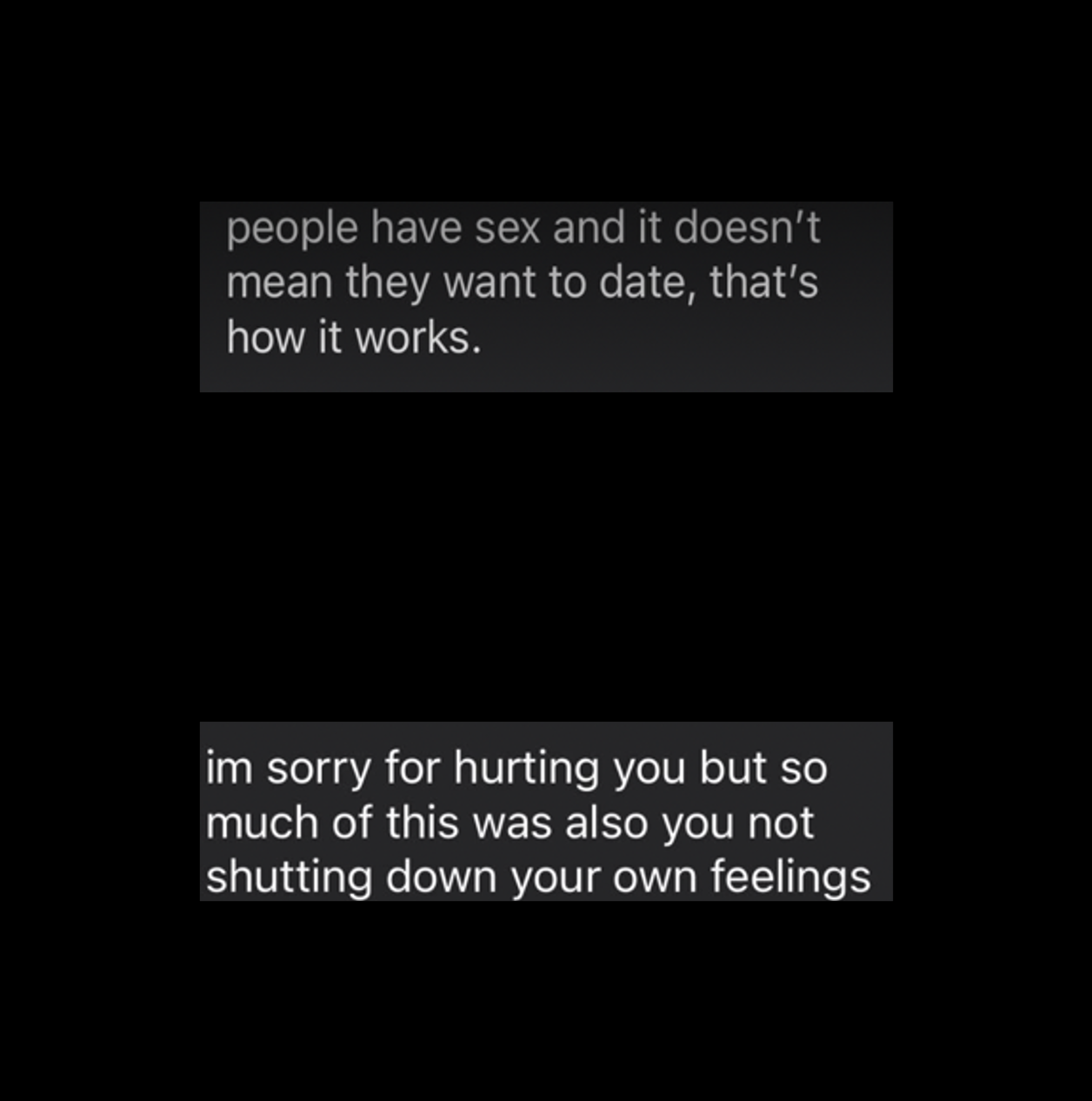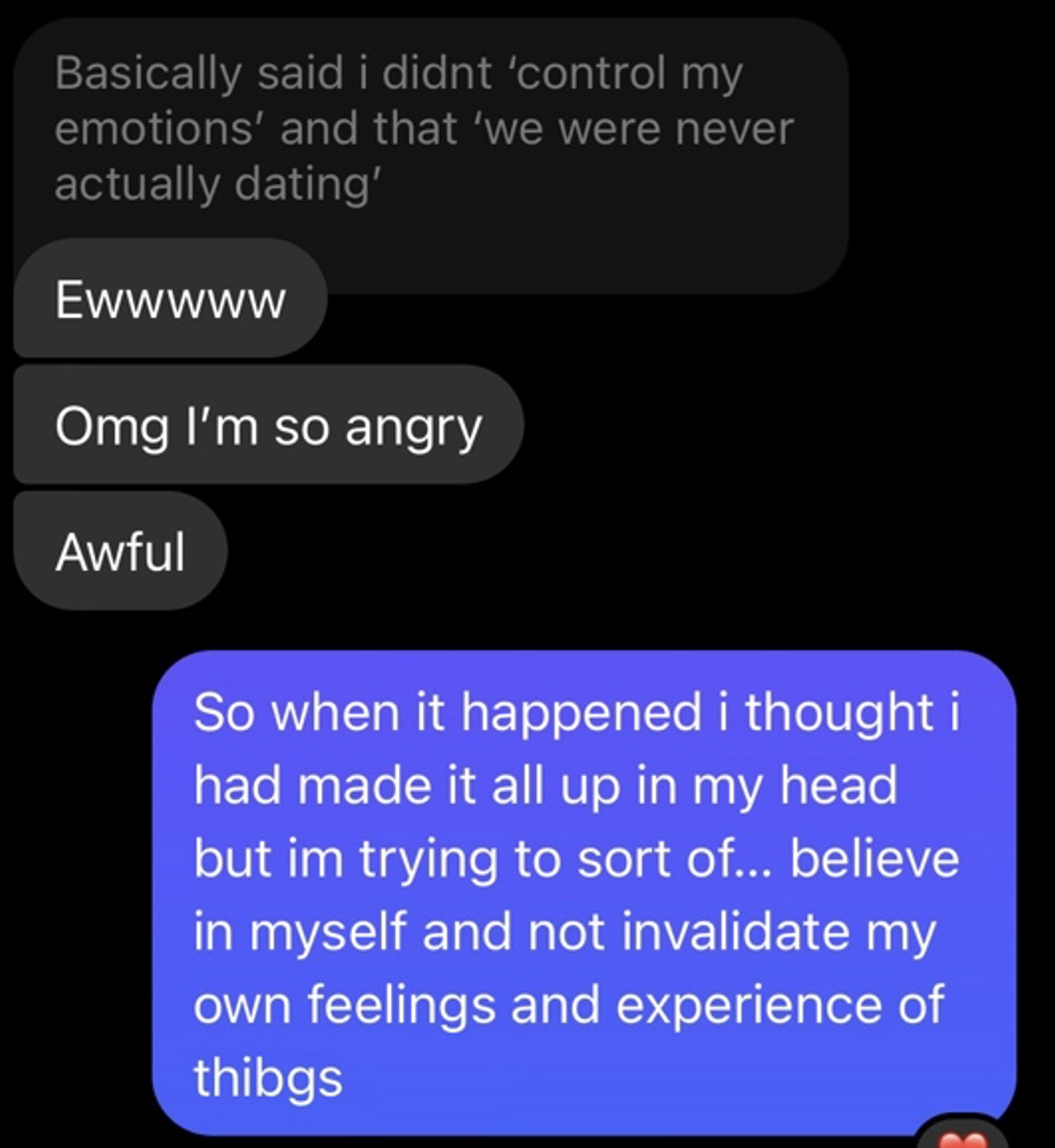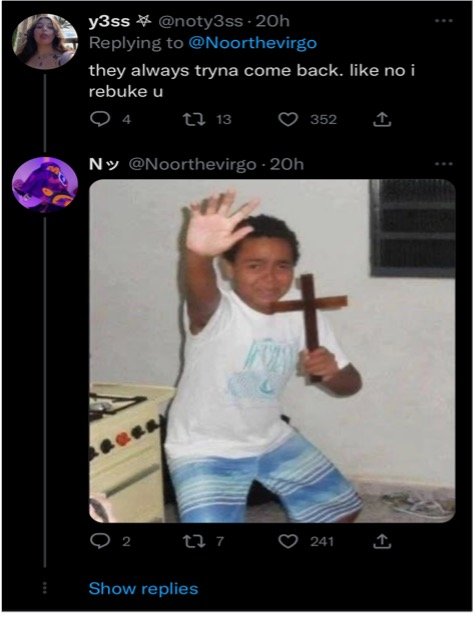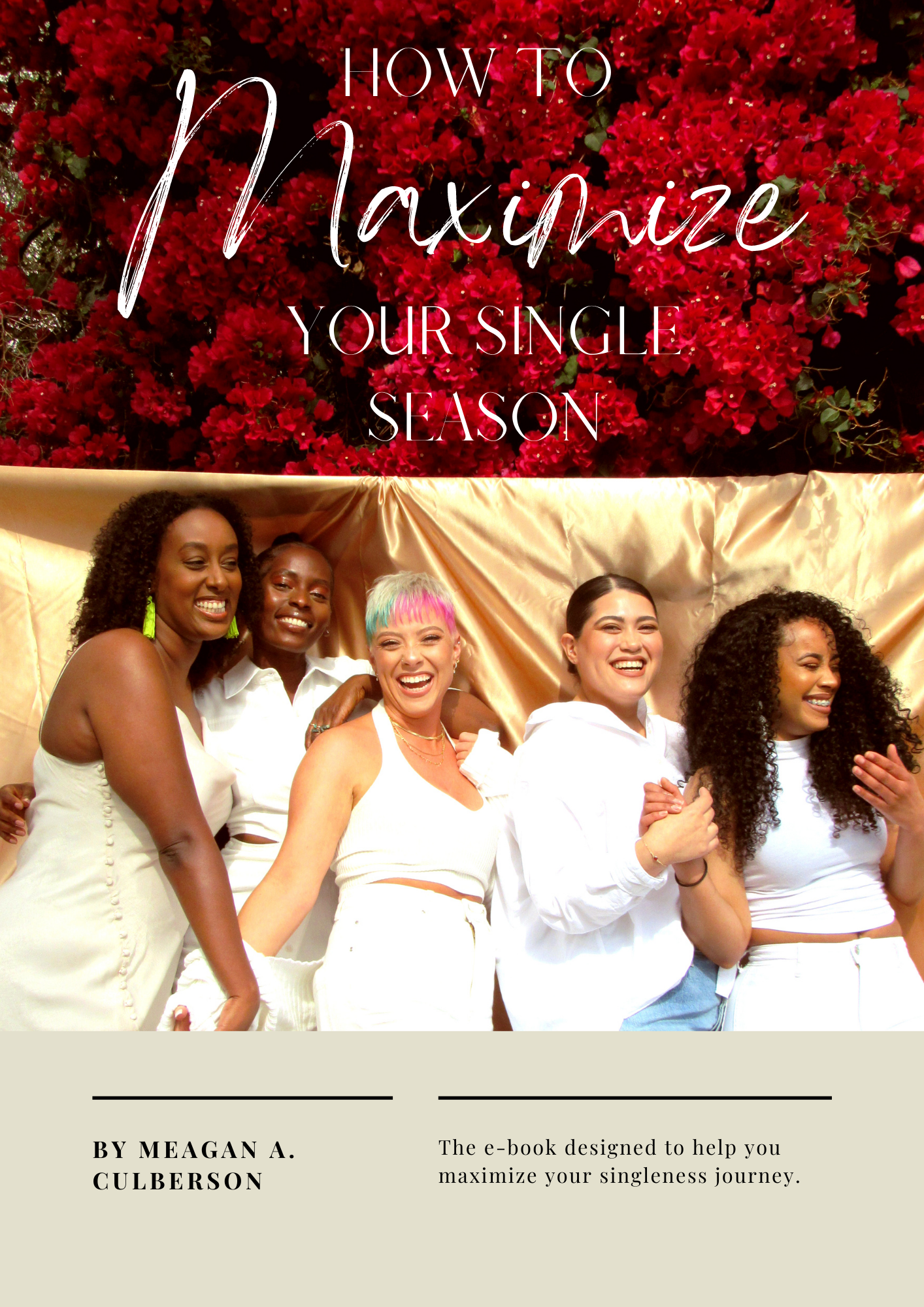Breadcrumbing in the Digital Age
If you put a frog in a pot of water, and you slowly turn up the heat, the frog will fall asleep without noticing it’s about to boil to death. Breadcrumbing in a relationship is similar. You start off strong – ‘I had fun’, ‘when can I see you again’, ‘good morning’… and slowly, steadily, you start getting less back. Texts come days later, there’s an established closeness but a definite distance, and you become confused. What’s going on? You don’t know. ‘Are you not interested in seeing me anymore?’ They tell you no, they are, they’re just busy. Okay. So you carry on. And on, and on. Rejected, seduced, pushed away, pulled back in, ‘I can assure you you’re in my thoughts a lot’ to ‘I’m looking forward to us just being friends,’ a steamy DM to radio silence. There’s no seeming logic or reason, any attempt at discussing the situation is thwarted, you’re not alone but you’re alone. I didn’t know what it was when it was happening to me, and couldn’t make any sense of it, until I came across a twitter thread (below) about breadcrumbing the day after everything finally ended, and all the bits and pieces suddenly came together like a really fucked up puzzle.
I’d heard of leading on, of being gaslighted, but not of breadcrumbing, which is the strange and disorienting cousin of both.
‘Breadrcumbing’ is both a stupid and great name, coined by the same lost, disappointed, and hilarious generation that collectively voted to call a freight ship Boaty McBoat Face. Sometimes known as Hansel and Gretelling, breadcrumbing is a ‘soft’ common dating manipulation style, that seems to have flourished out of the social media and online dating era.
It’s giving someone the bare minimum (breadcrumbs): morsels of affections or attention that show a person you like them despite having no intention of pursing a romantic relationship with them. While it’s not the same thing as gaslighting, which deliberately makes the victim question their perceptions of reality, both breadcrumbing and gaslighting (conscious or not) control relationships, involve personal knowledge of the other, and make the victim doubt and question their perspective and the perpetrators intentions. If allowed to run its course, breadcrumbing can reach a peak of pure toxicity towards the end, because it is also a way for the perpetrator to absolve themselves of hurting the other person by throwing out such classics, like ‘it’s your fault for not controlling your emotions’ or ‘we were never really dating’. To a certain extent, the Breadcrumber controls the dynamic and perception of the relationship/situationship, and, knowingly or not, they try to control their role at the end of it too.
Breadcrumbing could be a way of keeping someone as a backup, as a maybe, as an option, without ever really valuing or treating that person as someone important in your life. I had to explain the term to all my friends, who hadn’t known the name but certainly understood what it represented.
So how often does this happen? I don’t know- but it seems that, to one degree or another, a lot of people are the victims or perpetrators of this behavior.
What Does Breadcrumbing Look Like? Here Are Some of its Trademark Signs:
Inability to make or commit to plans.
Micro communication (not ignoring or blowing someone off, but rather dropping small, exclusively digital, bits of communication, sometimes as small as commenting on Instagram posts or stories.) I.e., doing the bare minimum to maintain a semblance of a relationship without investing much time or effort.
On and off moments of brief connection, followed inevitably by periods where the breadcrumbee feels (and is) ignored.
Surface level thoughtfulness such as, for example, the breadcrumber checking in on someone's day or following up about something specific. Then, once the person responds, not messaging them back for days, or responding with a brief and surface-level answer.
Breadcrumbing involves a small-but-inconsistent supply of interest that keeps someone feeling as though there is the potential for more and questioning whether the perpetrator cares about them. For example, I couldn’t pinpoint our relationship from the get-go. I’ve had casual dalliances; I’ve had deeper connections. I couldn’t understand where I existed in the solar system of his existence. I couldn’t dogear what way and to what extent he cared about me. When I had asked if he actually cared about me, it was because I genuinely had no idea whether he truly did or not. And I feel sorry for the slightly younger version of me, for sticking by someone she didn’t even feel cared for her. This meant that I couldn’t adjust my expectations, my hopes, or my emotions, because I had no idea what could be and what couldn’t. After all, it takes two to tango, quite literally.
We facetimed, hung out, we’d be close, and we’d be far. We did share personal truths, realities, events. We did have softness and kindness, and a closeness that you wouldn’t have with just anybody (or so I thought). But he’d disappear, and he wouldn’t remember the important stuff, or ask the real questions. He wasn’t there to help me when I was low, and he didn’t text or call to share his successes, news, frustrations. He said he was a bad texter, I have friends who are like that, so I made the effort to reach out. Would I usually triple text someone? No. But if we’re close, and you’re a notoriously bad texter, I might. I bought him a birthday present, he did not. I remembered his birthday, he did not. I tried to have dialogues about our weird relationship that he hated having and barely participated in, I tried to create platonic boundaries he’d break, I tried to take space away from him.
So Why Does a Breadcrumber Breadcrumb?
Every relationship is unique, but there are several potentially desired outcomes that may explain why someone could be breadcrumbing.
Self-esteem Booster: The breadcrumbers may only be engaging with someone to make themselves feel better, as a mood lifter for when they’re feeling low.
External Validation: The knowledge that someone is into them, even if the feelings aren’t mutual, can go a long way to boosting someone’s confidence.
Prime Immaturity: The breadcrumber may not be ready to settle down and commit to anyone. If this is the case, they might like the feelings that come with having the real potential for a relationship, while being unable to commit. Therefore, they keep the option available to themselves but never act on it.
Emotional Uneasiness: Breadcrumbers are often adverse to conflict and confrontation, so they tend to avoid negative or stressful interactions. This is all a result of self-centered fears (rejection, commitment, etc).
Staying in Contact: A tough example of breadcrumbing to identify, since it often happens after a ‘breakup’ or ‘split; of some sort. In this case, the breadcrumber might think they're only checking in on a former partner, but are in actuality retaining some beneficial part of the relationship for themselves and refraining their former partner from moving on.
Narcissism: Those who breadcrumb others often have been found to have personalities associated with higher levels of narcissism. This is true even if they are aware (and sometimes they aren't) that they’re manipulating people for fleeting and superficial personal gains.
You’re reading that list and hoping that your breadcrumber is a victim of C, and that they’re worth fighting and waiting for because, deep down, they want you. That’s not how it goes, it’s not true, and, ultimately, it doesn’t matter. Your time is precious, and having your time disrespected or wasted, is not fair or right. Someone not meeting your needs while you cater to theirs, along with a proven track record of disappointing you, is not something you can allow yourself to accept.
Breadcrumbing is lethal because the more time passes, the more you learn to lower your standards and accept the bare minimum of love and attention.
With the bare minimum, you will never be able to feel safe, at peace, loved, or be yourself. That’s why not choosing them is painful, but absolutely the most important thing you can do for yourself. You can be direct and let the person know the impact of their behaviors, ask them for what you want, you can try and not reinforce their behavior, but the most essential thing you should do is love yourself as you would your best friend. I should’ve stuck to my guns, loved myself enough to drop the man a month into knowing him- and, since you’re reading this, I obviously didn’t. But it’s true, we have got to ask ourselves what our role is in constantly choosing our breadcrumber. They may pull us back in, and so? Why let them? Why choose them again? When you factor in the human element, it’s easy to understand why it’s so difficult: we’re all internally complex, with real lives, real flaws, real subtexts, real contexts, and real feelings. But the bottom-line is, you need to love yourself and honor the relationships and life that you want.
Don’t ask yourself what you’re losing, but rather what could be gained by not engaging with this person that is using up your energy and love by making you wonder how they really feel about you. Instead, find someone who makes you feel secure, and lets you be yourself carelessly. If you feel the need to assess what you’re losing, think of all the negatives you’d be giving up: frustration, anxiety, sadness.
In the end, I had so many questions I wanted to ask, because all that confusion had finally come to a head, but much like it had been all along, there was no clarity, and no real involvement on their part. I didn’t have the knowledge or vocabulary to nail down the central question, the conversation, which was the very nature of our relationship. I became accumulatively hurt, and disappointed, which fastened the pace of our push and pull dynamic even more, until it broke.
It's the manipulative element of breadcrumbing that makes the whole experience that much more hurtful: the invalidation of the breadcrumbee’s experience, the things they felt, thought, heard, and perceived between them and their breadcrumber. I knew then as I know now, how unfulfilling, and painful a dynamic like this is. It makes you fall asleep at the wheel of your emotions and the situation. It makes you question and repress your wants, your expectations, and makes you become resentful. It stresses you out and forces you to gaslight yourself. It stops you from going out there and finding someone who will actually deserve you on the first try.
Was he a bad person? No, not at all. Was he a bad person to me? Yes. He had asked me to keep a blindfold on for the duration of our relationship, and would get stressed, angry, or annoyed when I told him I couldn’t, or didn’t want to, or that I was once again lost, and no longer understood where I stood in relation to him and myself or what he wanted from me. It takes distance sometimes to realize how unhappy you were in something. How the potential for something real and easy was twisted into something entirely hollow so early on. When I told him we could no longer be in each other’s lives he got angry, saying that it ‘sucked’ that I had ‘to turn him into a villain’ to move on. The heartbreaking truth is, in my story, this person that I truly cared about, was harmful to me. In the end, someone I had been friends with- close friends, I thought- and who I did have a physical and emotional connection with, treated me like I was a second-class friend, an affable acquaintance. That, my friends, was what turned the painful into the absolutely devastating.
Someone you’ve fought for, and given so much to, giving you absolutely nothing in return constitutes a mind-blowing betrayal I can’t really explain. I don’t think you can forgive something like that. Why would I ever trust someone, or actively choose to trust someone, who disappointed me so intimately ever again? Actually, the healthier thing to do, for someone who’s been breadcrumbed, is to not forgive. He broke our friendship and broke my heart and left me with ‘I don’t owe you anything.’ If you were my friend, and you truly cared about me as a friend, you wouldn’t flirt with me, sleep with me, and then push me away. Sex is not that difficult a temptation to resist, especially if you don’t have feelings for the other person. Especially if you care about the other person, and you know you’re going to hurt them. And certainly, if you’re my friend, you’ll at least give me the dignity of talking with me in person.
One of the darkest aspects of breadcrumbing is that it typically exerts its power on people who the breadcrumber knows have strong feelings for them. This often results in, as it did in my case, the victim suppressing their own needs in order to preserve their attachment to the breadcrumber.
Forgiveness, trying to ‘be friends,’ ‘starting over,’ it’s not going to work. You’ll immediately step back into that dance, that role. You need to really end things and mean it, because you’re not asking for too much, you’re not being needy, nor are you being an attention seeker.
I once told him I wish we’d met as kids. I guess now what I was trying to say was what we both knew: that we’d be happier together as less complicated and messed up people, at a better time, the right time. Timing dictates where you are in your growth, your life, geographically, mentally. But bad timing doesn’t make this behavior inevitable, or okay. Deciding what you are willing to tolerate is only half the challenge, actually standing by your own boundaries and not accepting anything less in practice is the other half. Don’t beg for or get excited over an afterthought, some scraps, a couple fucking crumbs. Forget ‘potential,’ who they are now, right here, with you, is who they are, who they are going to be, and who they choose to be.
He wanted a friend, wanted sex, wanted connection, wanted space. He took no sides so he could have a bit of everything, and nothing ever as a whole. He didn’t want to lose me, but he didn’t want me either. I was following the natural progression of whatever we had been, while he wanted it frozen in time. I feel like I was stuck in this little box in his head that I had outgrown a long time ago, which he also knew but ignored. His behavior stressed me out; I hadn’t been able to feel safe, or be myself, with him, for two years. Friendships, relationships, every shade of connection, should be clear and safe. Remember: if he wanted to, he would. If you’re confused, it has got to be a no from you.
At the end, know that you don’t need that person who hurt you to validate your feelings. I don’t need the man to tell me he had feelings, maybe, or that it wasn’t all in my head. I don’t need him to agree with me that his behavior was short-sighted, cowardly, and unkind. The reality is, it’s not about what people owe to one another, but what you owe yourself. You must be honest with yourself and learn to hold up what you truly necessitate. He will never give me answers, and I can never choose him again. If you have been breadcrumbing someone without meaning to, let them go, and don’t come back. If you have been breadcrumbed, know that being single and dating doesn’t have to be like that. If you have to ask someone to remember your worth, then they’re already not worth your time, your space, any part of you or your life.
Shop Now








